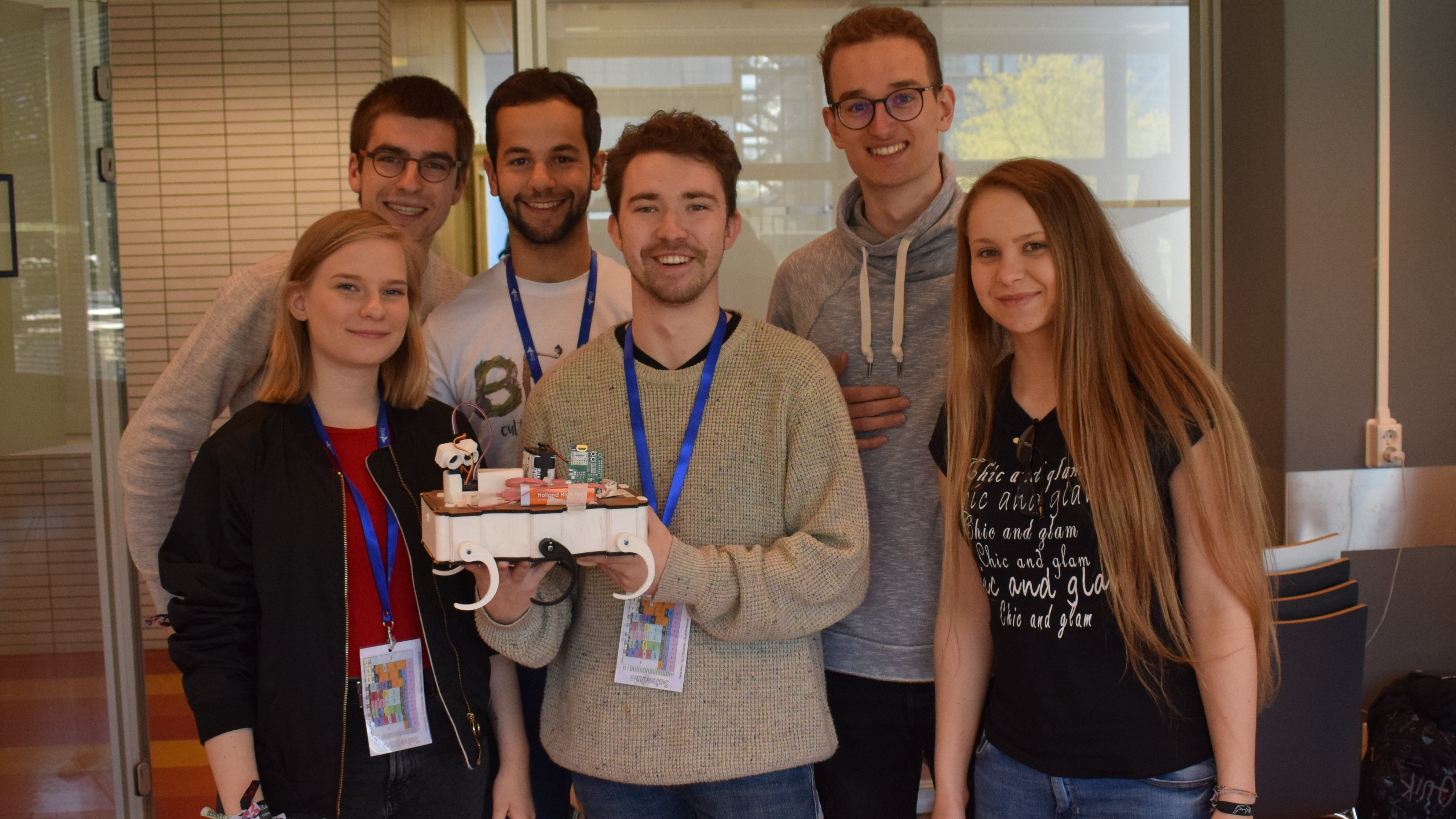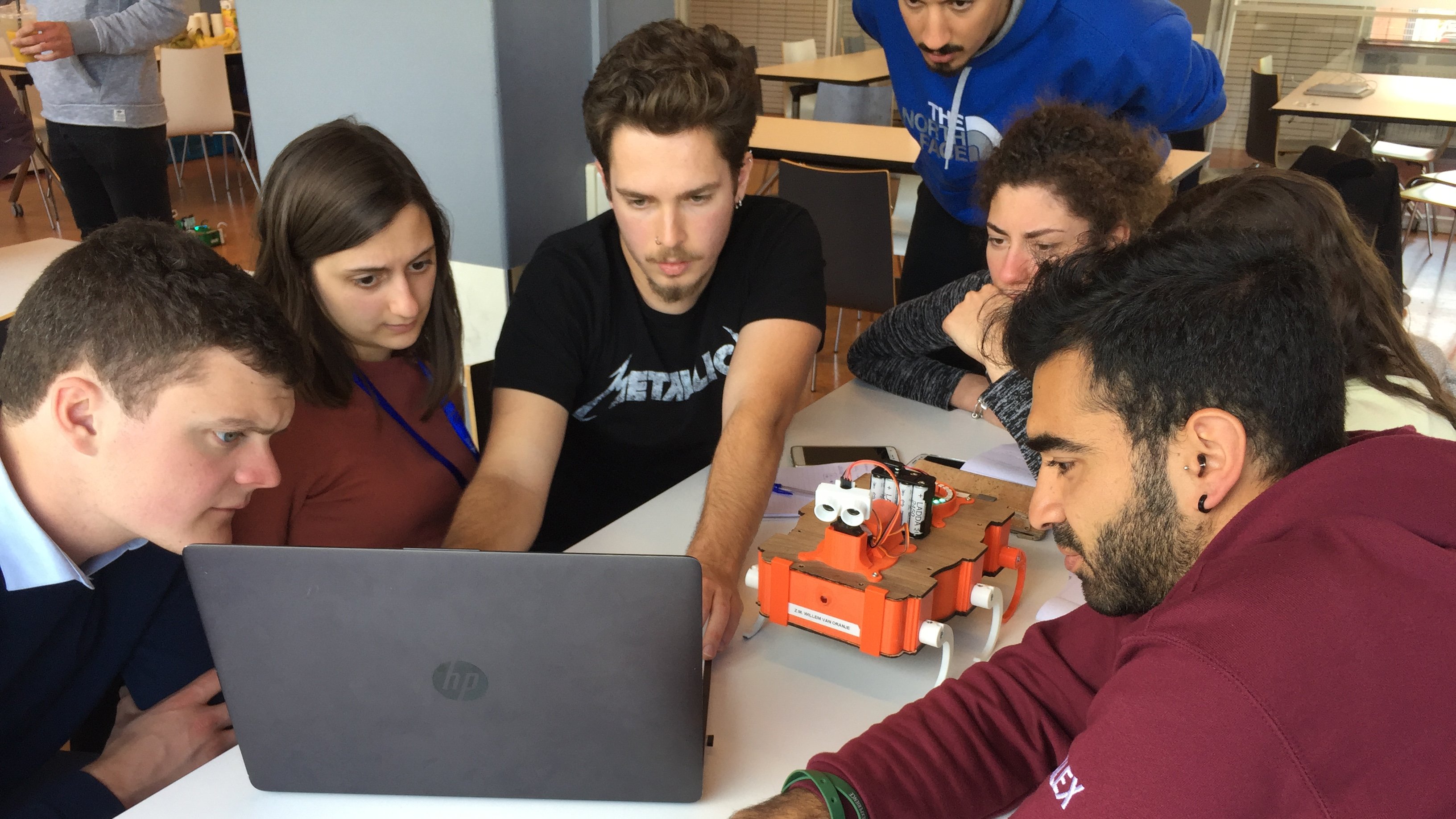David de Gruijl and Rémi Fourcoual organised the 2018 BEST spring course at TU Delft. In May, 24 participants from 17 different countries spent nine days learning all about swarm robotics. David and Rémi meanwhile learned everything there is to know about organising such an event. They now hope to encourage more TU Delft students to visit similar courses abroad.
BEST is the Board of European Students of Technology, an organisation of study associations at 97 European universities of technology. All year round, courses are being organised all over Europe. In Delft, the spring course is a tradition. This year’s subject – Global Swarming, a Robotic Revolution – attracted some 250 applicants for 22 places. “Depending on the topic, we get on average 300 applications every year,” says electrical engineering student David de Gruijl, who was overall coordinator of the event. “You don’t have to be a member of BEST to apply, as long as there is a BEST association at your institution”, adds Rémi Fourcoual, civil engineering exchange student.


While the topic is announced around September, organising the course starts even earlier. David: “We can only decide on a topic once we have found at least one professor willing to help us and give lectures.” This year, that was Chris Verhoeven, who is in charge of swarm research at TU Delft’s Robotics Institute. But a topic is just the beginning. Lectures, assignments, food, accommodation, entertainment: the core committee has to arrange it all. Then there is the funding to take care of, because BEST bears most of the costs. “Participants only have to pay for their own travel arrangements, plus a contribution of maximum five euros per day, depending on the GDP of their country of origin”, explains Rémi.
In fact, all year round BEST organises events to pay for the expenses of the spring course. “We organised a recruitment event for Rolls Royce, for example, and TU Delft also sponsors the event”, says David. “We also try to get sponsoring in kind, like a free breakfast or soft drinks. In exchange, we take publicity photos and share them on social media.” Unfortunately, BEST is only a small fish in a large pond, where sponsoring is concerned. “We get a lot of competition from other student associations in Delft. Our success rate is maybe only two or three percent. That means we have to put in a lot of effort.”
Accommodation is another yearly concern. “It has to be big enough, affordable, and a bit of noise shouldn’t be a problem”, David explains. “During the week we could stay in a scouting clubhouse in Delft, but the scouts use that themselves on weekends”. This year, they moved to Amsterdam for the weekend, where they could stay at another clubhouse. “There was a misunderstanding about when we would arrive, so we had to wait three hours for the keys and had little time to prepare. Also, the place was rather small”, Rémi remembers. “But the location was amazing, and it was within walking distance of the city centre. That made up for everything else.” Luckily, they were able to deal with such issues behind the scenes. “The team member who was in charge of the food dropped out because of exam pressure. It was unfortunate, but we just had to get on with it”, says David.
It is all part of the learning process, they believe. “As coordinator you have to keep your team of people from different backgrounds motivated the whole time and make sure they meet their deadlines. I learned a lot from that.” Rémi became an expert at time management. “I was combining student life with my work for the association. You have to meet your responsibilities in both cases.” Being in charge of social events was also a first for him. “I got a lot of advice from last year’s organisers on what went well and what went wrong. I didn’t want to copy and paste that, so I tried to come up with new ideas”, he says. “For example, one night we went on a pub crawl in Delft. And during the weekend in Amsterdam we organised a BEST alumni night.”
The best experience was meeting people from 17 different countries, they agree. With ‘empowering diversity’ as part of BEST’s mission, only two people from the same country were included in the group, two Brazilian exchange students among them. Add to that the two participants from BEST’s Canadian partner organisation, and the mix was complete. “That really destroys any stereotypes you may have about nationalities”, David says. Rémi: “Some participants have not travelled that much, or are shy to speak English. In that one week, you see people change. In such a small group you get to know people really well in a short time. Some of them are already meeting up again this summer, after only one week.” David, who also helped organise last year’s course, is still in touch with some of the participants back then. “We contact each other and meet up when we are visiting each other’s countries.”
Naturally, the academic element of the course is also important. “We had a varied programme with different kinds of learning experiences”, David explains. That included lectures on swarm robotics, but also on swarming behaviour in nature. They visited robotic start-up companies at RoboValley, and as a final assignments, they tried to make robots swarm. “The Robotics Institute provided us with Zebro robots. In the end, the students managed to let the Zebros communicate, but not swarm. That was a bit too much in the short time they had.” It still earned them one ECTS. “Every year, it is a discussion point every year whether we should offer the ECTS or not. It means you have to include 28 hours of academic content in your programme. But we get a lot applications each year because TU Delft is renowned university. People like to have an ECTS from Delft.”
David and Rémi have since parted ways. Rémi is continuing his studies at the Institut National des Sciences Appliquées de Lyon (INSA). “When I was in Delft, I missed France, my friends and family, but I made a lot of new friends here. The association played a big part in that”, he says. David is going to China to study Industrial Engineering in Hong Kong and at the famous Tsinghua University. “Before I came to Delft, I had a gap year in the US and loved the international environment. I found that again at BEST, where I am one of only a few Dutch members. We are trying to get more Dutch students interested in the association.”
They also hope more students will find their way to the BEST courses. “Of course, students are often really busy, but you can go during summer as well. There are dozens of courses to choose from each summer. Besides, if you don’t have a lot of opportunity to travel, this is the cheapest way to do it.” BEST even gives a workshop on how to write an application letter. “Because we do the selection for our courses, we know what others look for in those letters. So people who are motivated to go, should talk to us”, David explains. “A lot of people come here, but we would also like to see more TU Delft students going abroad. But it is really a no-brainer. Why shouldn’t you go?”
David de Gruijl
Country of origin: the Netherlands
BSc in Electricial Engineering
Rémi Fourcoual
Country of origin: France, INSA (National Institute of Applied Sciences) in Lyon
Exchange student at Civil Engineering in 2017-2018
Personal information:
Name: David de Gruijl
Country of origin: the Netherlands
BSc: Electricial Engineering
Personal information:
Name: Rémi Fourcoual
Country of origin: France, INSA (National Institute of Applied Sciences) in Lyon
Exchange student at Civil Engineering in 2017-2018
